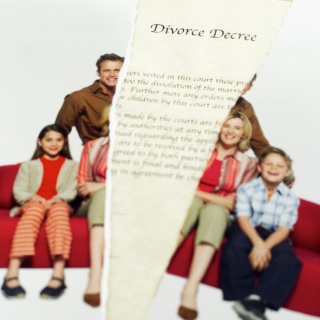Your Child Is Not a Statistic: The Truth About Divorce Studies
Your Child Is Not a Statistic: The Truth About Divorce Studies

The negative stereotypes. The gloomy predictions. The frightening news reports. If you are a parent whose marriage has ended in — or is headed for — divorce, you can't help but feel anxious about the well-being of your children.
Naturally you want the best for them. You may be asking yourself, "What will this do to him?" Now more than ever you want to give your child everything he needs to feel your love, support and guidance. Yet suddenly everything about your family seems to have grown more difficult and complicated. It all begins with communication.
This exclusive four-part series on firstwivesworld will make talking to your children about the divorce easier than you could ever imagine. Each week, age-appropriate excerpts from my book Helping Your Kids Cope with Divorce the Sandcastles Way will give you the language to use, whether your child is a toddler or teen.
The approach is based on a program — now mandated in family courts nationwide — that I created to help children of divorce. I chose the name Sandcastles, because I visualize the image of a child molding a new "home" of sand to replace the old one that turbulent waters swept away. This is a mission every child who has experienced divorce must complete in order to heal and flourish emotionally.
Don't be discouraged. You certainly will face challenges, but you also have a huge opportunity to guide your child through your divorce in a way that will help them to feel loved and supported.
First, you must understand these truths:
Divorce doesn't go away. Using the words "divorce" and "final" in the same sentence can be deceiving. The dissolution of your marriage is not a single, isolated event. It is a long journey full of gains and losses. There will be breakthroughs and setbacks — periods of calm and crisis. Long after the papers are signed, divorce will play a major role in your family's life. It will figure prominently in your child's life now when he is just a youngster as well as later when he decides which of his parents should take him to visit college campuses. It will affect your daughter's wedding plans. And it will likely inform each of your children's own love relationships — for better or worse.
Divorce studies can't predict how your child will fare. We've all read the dire reports of how badly children suffer when parents end their marriage. It's important to note, however, that the full impact of divorce on children and families is a relatively new field of study. All studies have limitations and experts are human beings with their own biases and hypothesis to prove. For example, some of the most popular and oft-quoted studies on children of divorce sample fewer than 100 families. And most of the research examines children who are not involved in a support group or receiving psychotherapy. Keep in mind that a study, no matter how scientific, can only tell you what's happened to someone else's child. It cannot forecast how your divorce will affect your child.
It's not the divorce, but how you handle the divorce. Ultimately, you — not the statisticians and pollsters — will determine how your children experience divorce. How parents choose to handle issues and challenges in their split, not the split itself, is the biggest indicator of how children will fare today and into the future. Does that sound daunting? It can be, but think of it as a tremendous opportunity — because it is. No one knows better than you what is best for your child. No matter how many friends, psychologists, teachers and family members weigh in with advice and opinions, follow your heart. You and your child share an extraordinarily strong bond. You don't have to be an expert in child development to know that your love as a parent gives you the best chance of offering your child the security, guidance, structure and support he needs.
Click the following to jump to the age-appropriate article for you in this series:
How to Explain Divorce to Your Preschooler
How to Explain Divorce to Your Six - Eight-year-old
How to Explain Divorce to Your Nine - Twelve-year-old
How to Explain Divorce to Your Teen

Comments
When the Alternative to Divorce is So Much More Damaging
Post new comment